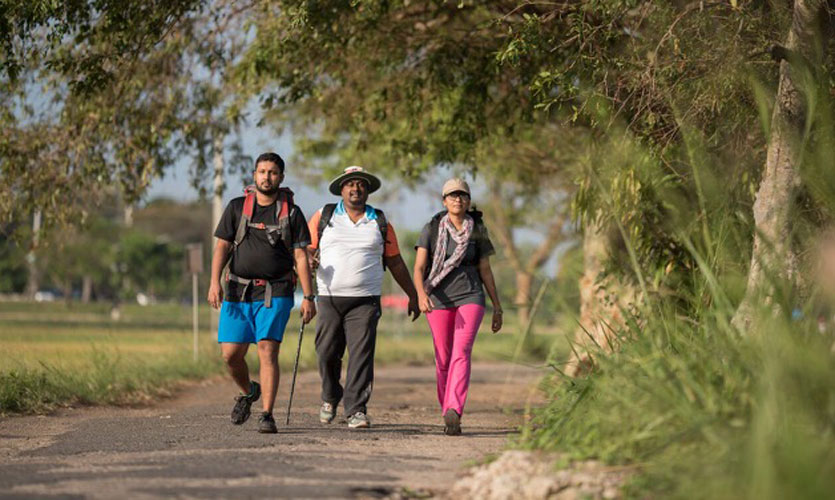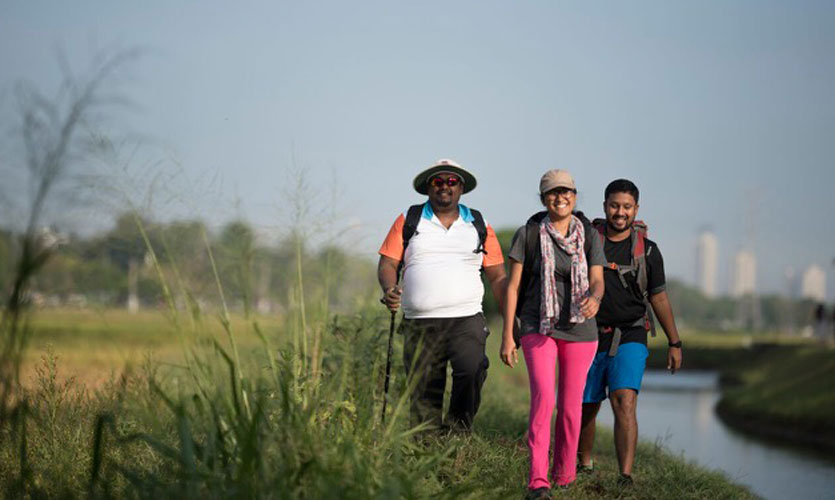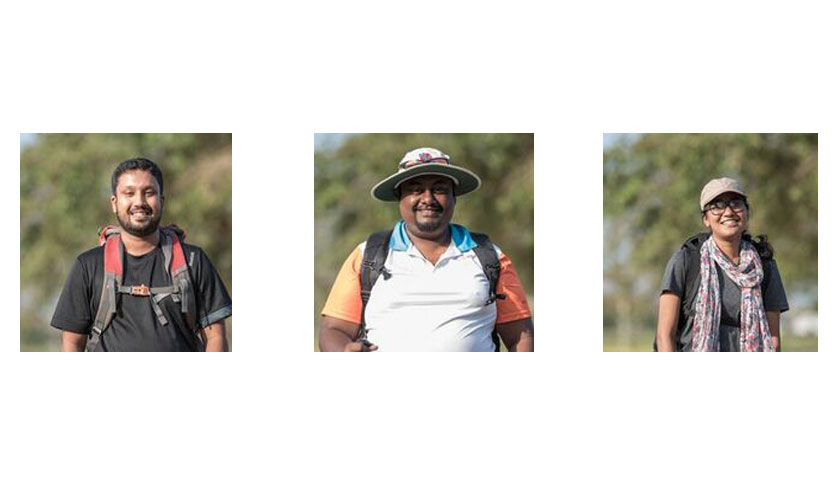Mar 13 2018.
views 487There are 8-10 deaths by suicide every day and about 20 attempts per death on average. The attempts are increasing but deaths have reduced over the years due to the banning of certain lethal substances and improved pre-hospital care and transportation facilities. However, suicide is still a major public health concern in Sri Lanka.
Meet Nivendra Uduman, counseling psychologist and Founder of Letter Earthlings. He has won an Award of Excellence in service for work done in the field of mental health as an alumnus of Christ University and he is also the founder of ‘Footsteps to Freedom’, a 550km walk from Dondra to Point Pedro in Sri Lanka conducting over a 100 workshops along the way aimed towards raising awareness on mental health and combatting stigma surrounding mental illness.
For the second consecutive year, Nivendra returns for Footsteps to Freedom II, a walk around the coastal lines of Sri Lanka for mental health and suicide prevention. This 72 day walk aims to raise awareness on Suicide Prevention by conducting a number of workshops along the way and raising funds for the CCCline1333 and Shanthi Maargam organizations that work towards the cause. He will be joined in this journey by Ranil Thilakaratne from the CCCline1333 and aspiring psychologist, Sara Nazoor.
What is Footsteps to Freedom?
- ‘Footsteps to Freedom’ is a project that infuses my passion which is mental health with my love for Sri Lanka and its people. It is unique because it allows me to see my countryfrom a different lens and it connects me to people, heart to heart. This year, I will be walking with Ranil Thilakaratne from the CCCline1333 and Sara Nazoor, an aspiring Psychologist. We will be walking around the coastal line of Sri Lanka for 72 days, to raise awareness on suicide prevention and mental health. There will be awareness raising sessions and workshops delivered along the way, to empower and educate people on how they can care for themselves and others. This I believe is a powerful way to reduce suicide rates in Sri Lanka and also to promote better mental health for all. ‘Footsteps to Freedom’ is an opportunity to start having conversations that we usually push under the carpet and to shatter the stigma that surrounds suicide and mental illness in the country.

This is your second time. Let’s go back to the beginning. What made you decide to start this initiative?
- I was involved in flood rescue work in 2016 and I met Maj. Ruvan Ranatunga (Ex- army) who had walked across Sri Lanka in 2014 to raise funds for a charity working with those living with cancer. He inspired me to set off on my own journey to raise awareness on mental health. I wanted to do something different and I wanted to create something meaningful and impactful, and therefore I set off on a 550km journey on the 18th of August,2016 from Dondra and reached Point Pedro on the 31st of September,2016. 44 days with a 15kg pack on my back really made me see Sri Lanka in a very different light than I was used to and I believe I positively impacted lives that I touched along the way. Maj. Ranatunga said ‘Nivendra, if you save one life through your walk, then you’ve achieved your goal’ and I believe I did justice to that statement. I am walking again this year, to connect with a whole different side of Sri Lanka and to reach more people. This year is very challenging, with 1400km to cover, in the searing heat. But, I along with my team will make it.
This year’s theme is based on ‘suicide prevention’. Why is this the highlight of your awareness campaigns?
- Suicide is a major public health concern around the world and Sri Lanka is no exception. We have been battling with suicide since the early 1990’s, when it gained prominence due to the increased number of deaths reported in the country and it has since been a psychosocial issue that has rarely been addressed. Deaths by suicide have decreased over the years due to the banning of several lethal substances by the government and due to the improvement of pre-hospital care and transportation facilities. Lives are being saved, but, suicide attempts keep increasing as we speak. There are approximately 8-10 deaths everyday due to suicide and about 20 attempts per death on average. Suicide is not exclusive to a particular age group, social class or economic status. We all have a certain vulnerability to develop suicidal thoughts at some point in our lives just as we have a propensity to develop mental health problems. Hence, I believe it is important to combat the stigma that surrounds suicide and mental illness in Sri Lanka and to start having conversations about our mental health. It is the responsibility of the community to prevent suicide and in order to do that, there needs to be awareness and education provided. Suicide can be prevented, lives can be saved, and problems can be solved with the right coping skills and strategies.
This is what I want ‘Footsteps to Freedom’ to be about. I want people to feel heard, to feel understood and to feel validated even in times of despair. I want families to understand what mental health is all about. I want people to feel safe enough to ask for help, to be able to talk about their feelings, and for individuals and families to have mechanisms where they can ventilate. We will be providing information on how and where to seek help for emotional difficulties right throughout the walk. This we hope will be a beacon of light for those who we meet along the way.
CCCline1333 and Shanthi Maargam are two organizations that are partners of Footsteps to Freedom. What role do they play?
- CCCline1333 and Shanthi Maargam are two organizations that do significant work around emotional well-being and suicide prevention in Sri Lanka. Shanthi Maargam is an organization that works with children and young people through its ‘Art of Living’centre currently located in Borella. The intention is to promote emotional well-being through different creative mediums including art, drama, yoga, karate etc and also to create safe spaces for young people from all backgrounds including those who identify as LGBTIQ and PLHIV.
Shanthi Maargam also provides pro-bono counseling services for the community and also runs a 24-hour hotline. Their work around emotional well-being plays a significant role in suicide prevention. CCCline1333 is one of the three telephone counselling/befriending services available in Sri Lanka. It is manned by volunteers and they are trained by Lifeline Australia. They provide a free, confidential service 365 days of the year, helping people ventilate; cope with difficult experiences and encouraging people to ‘come out of the shadows’. Their work around suicide prevention has a wide reach around the island and they are a powerful resource in the mental health system in Sri Lanka. We will be raising funds for both these organizations, to continue their fabulous work through’ Footsteps to Freedom’. Both organizations are also supporting the initiative in different ways.

The walk around the island will take you 2 months and within these two months you plan to raise as much awareness as you possibly can. What is the itinerary like?
- We have quite a busy itinerary on all 72 days that we will be walking. We hope to facilitate impromptu awareness sessions at schools, government institutions, police stations, tuition classes, tea shops, bus stops, community centers etc and we will also be conducting pre-planned workshops at several locations with the support of the Consumer Action Network Mental Health Lanka ( CANMH-LANKA), World Health Organization and the Mental Health Unit, Ministry of Health. We will be travelling through both urban and rural areas, and we hope to reach as many people as possible. You might find us walking into a tea shop, and addressing a gathering there and in the next moment, at a school talking to a group of young people about mental health. We will be walking approximately 20km everyday, while speaking to as many people as possible.
Suicide is a very stigmatized and taboo topic in Sri Lanka. Why is it important to remove the taboo around the subject?
-Nivendra : Suicide carries with it a great deal of stigma and shame in Sri Lanka, though there has been some progress over the years. It is not talked about, often hidden, and people experiencing suicidal thoughts are often neglected due to the lack of awareness. There are still beliefs around suicide that suggest that those who attempt suicide ‘are weak’, have ‘defects in their character’, have ‘weak personalities’ etc. The stigma around suicide affects not just the individual experiencing suicidal ideation, but it also affects the families of those who attempt suicide or take their lives.
There is a ‘wall of silence’ that envelopes families who have lost loved ones to suicide and they often face Ostracization and blame from the community. There is inadequate support for those who have experienced non-fatal suicide attempts and for those who are survivors of suicide loss. The stigma prevents people from asking for help, from reaching out for support and therefore they often suffer in silence. We need to shatter the stigma and create better resources for people to access support.
The stigma and the silence needs to be broken for people to be able to lead productive, fulfilling lives and we all need to reflect individually and together on how we ourselves sometimes perpetuate stigma and negative attitudes around suicide and mental illness. I often dream of a Sri Lanka where we can all feel safe to talk about what troubles us as much as we talk about what makes us happy. Lives should not be lost because of stigma, and we need to be at a place where we can be okay with not being okay and still feel supported. This is what we must advocate and fight for, together.
Sara: Presently the Sri Lankan society doesn’t acknowledge suicide as an issue, but it is. For an island with a population of 20 million we have a huge number of deaths by suicide. This is why we need to get rid of the stigma and bring it out of its shadows. The more everyone talks about suicide the more people are aware of it. Past and present research conducted in Sri Lanka has shown that awareness on Suicide can reduce the rates.
Ranil: People are scared to come out and talk because of the stigma. They bottle their feelings and emotions. Suicide is only the tip of the ice burg. There is much more happening beneath or inside a person. Suicide is only the outward expression.

How do you plan to address it and create an open discussion about it at these workshops?
- The awareness raising sessions and workshops we hope to do during the walk will deal with areas such as suicide prevention, alcohol and substance abuse, stress management, and also general mental health awareness. These will be interactive sessions where we will engage openly with our audience, in an informal manner. We will deliver short, and compact sessions with key information being provided. They will be more of conversations than workshops. We will also provide the space for people to talk to us personally if needed, and referrals will also be made to mental health and psychosocial services in the respective areas if required. We often find that sharing our own personal experiences with our audience helps them feel comfortable and therefore more able to open up about their own experiences. Normalizing mental health problems is also a great way to encourage conversation.
Running for the second consecutive time, how has Footsteps to Freedom changed from last year?
- ‘Footsteps to Freedom-II’- A walk around the coast for suicide prevention and mental health is exciting because there are three equally passionate people walking. We are great friends, have worked with each other in different capacities, and most importantly we blend well, together. We have a trilingual team this year and that is a massive strength especially when we head to the east coast and of course the north. There would be a greater audience that we can capture this time around.
The walk in itself is more grueling, and challenging this time around, and that is what’s beautiful about the entire project. We are looking at something larger than ourselves. We are leaving behind those who are our tribe, our work, and our other interests to just do what we are deeply committed to. We also have lots more support from the community than last time. There are people who have reached out and offered us pro-bono training and physiotherapy, public relations, and we have even been offered a backup vehicle for the entire two months. It is amazing how serendipity works. We also have a stronger set of volunteers helping us with logistics and there will be a team in Colombo always monitoring our progress and managing any issues that come up along the way.
Why is mental health important and what makes it something close and personal to you?
- Nivendra: Mental health is my life’s passion. It has always been a part of my life, right from school days as my father was and is still a volunteer with a charity that supports people with emotional difficulties. I have been exposed to what mental health is, and was always encouraged to talk about what I am feeling. Mental health is important to me and it is personal to me, as I have lost those who I knew to suicide and I have people who are very significant to me who struggle with their mental health. I also work with people in the consultation room who have difficulties and yet are strong beyond words. I gain a great deal of inspiration from those who I engage with in psychotherapy. I have also had moments of loneliness, sadness and anxiety, especially while at university and I knew then how valuable it was to have a strong support system. My parents have always been my rock, and so have some of my teachers at university, my therapist who I saw during my Masters and some very significant, close, friends in my life. I want people to feel that they are not alone in times of distress and despair.
Ranil: I have seen people around me, people I love go through this. And they were able to come out of it because they came out of the shadows and spoke about it. Everyone needs to talk about it. The government needs to do something about it.
Sara: As for my understanding mental health is an important aspect in our daily lives, it is the aspect that helps us process situations, emotions and experience. Every negative and positive experience we face in our life creates an impact and shapes who we are as people. Conflicts I have faced within myself, among people, families, races, and countries is what makes mental health so personal to me, because a result of a conflict can be positive or negative, but it depends on the way we understand each other.
How can people join the cause?
- Anyone reading this is welcome to join us during the walk. You can walk with us for a day or for several days. Information will be posted on our Facebook page http://\www.facebook.com/ftflanka/ and you can connect with our team in Colombo for advice on how to join us. You can also join us at our workshops, to facilitate conversation around mental health. Donations would be appreciated to the two charities we are funding, Shanthi Maargam and CCCline1333. Most importantly, you could start having conversations with your loved ones about mental health and well-being.
0 Comments